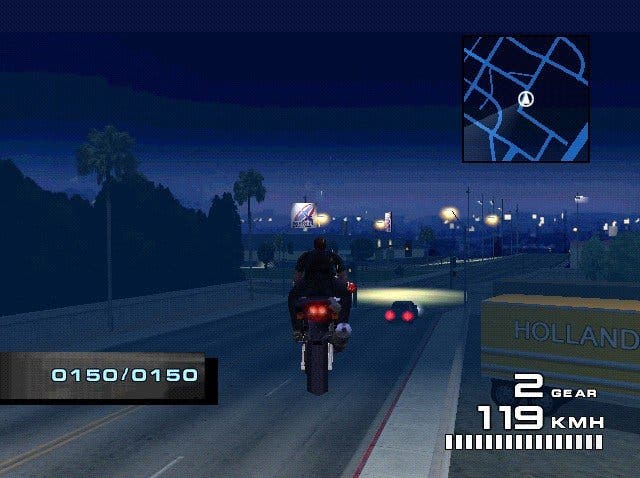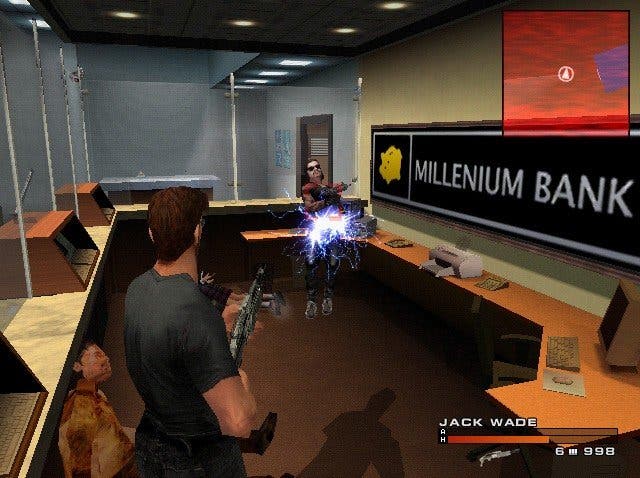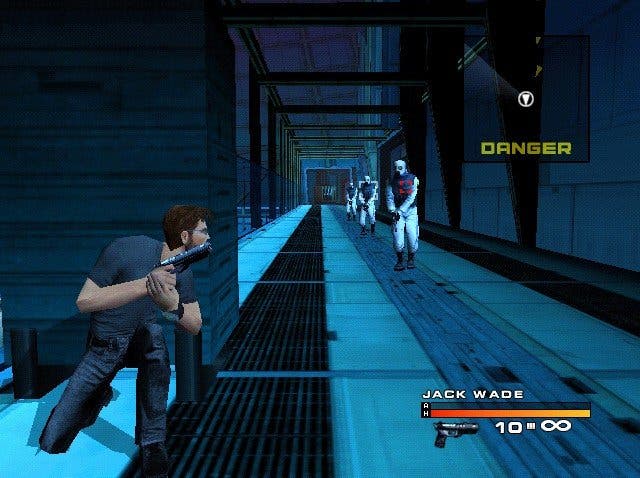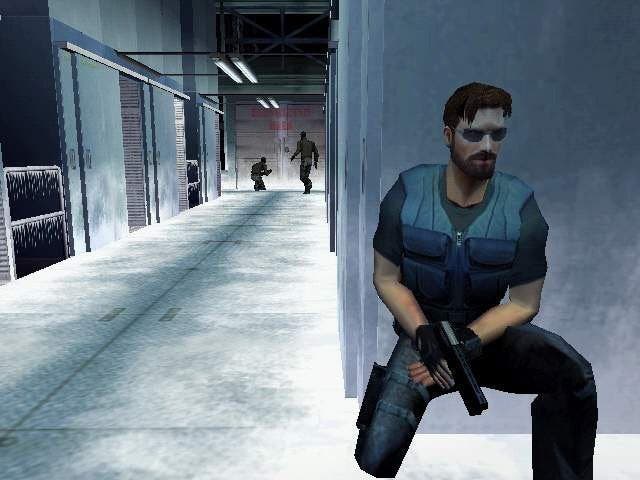Headhunter
Review - a delicious swansong for the Dreamcast, and arguably an MGS beater!

Eurocast
Headhunter is the second big Dreamcast game in as many months to be released in Europe exclusively. Unfortunately, like those fantastic-looking Japanese RPGs that we can see but never touch, it's slightly less exciting when you get your hands on it. Described (mostly by the American press) as an MGS-killer, and the sting in the Dreamcast's tail, Headhunter amounts to an immense and beautifully detailed adventure through a near-future dystopian society. It does live up to its billing. Eventually. Like Metal Gear Solid (and to a greater extent its elusive sequel), Headhunter is an extremely deep game. In terms of story and setting, it arguably has Solid Snake and the boys beat. The game begins with what will turn out to be one of its staples - off-the-wall news broadcasters painting their bleak picture of life under the privatised Anti-Crime Network. In a culture where bodily organs are more valuable than their weight in gold, and with so little left to privatise, the government has handed over powers of censorship, media control and propaganda to Christopher Stern. The ACN quickly develops into a lucrative business, with a training programme open to any civilian. It's into this picture that you - Jack Wade, a former ACN "Headhunter" - now step. After watching a back-to-back showreel of broadcasts plotting the life of Christopher Stern, the game begins with his death. For reasons which aren't immediately clear, at the same time you are bound to some sort of electric chair in the depths of a supposedly governmental installation, and after ripping yourself from the shackles and disposing of some guards you make a daring escape against the clock, fighting to get out before noxious gases overwhelm you. This is real "thrown in at the deep-end" stuff, and you find yourself running aimlessly through the corridors until it becomes obvious that this tactic will leave you dead.

Moving Target
Escaping the installation is easy once you've learnt a thing or two about firing your gun. The game's basic training mode will introduce you to the controls, and should be your first port of call when you start playing. It also introduces you to Jack. Jack, like most of the denizens of his world, is tall and slim - rather like the Todd McFarlane Spawn cartoons - and he has a reasonably bushy beard. Jack can duck, walk and run, but like Solid Snake he has a jumping deficiency, although he can dive into a roll from any position. He can also press his back up against the wall in crouched and standing positions, then using the L or R buttons duck his head and pistol around the corner to fire on his enemies. Unfortunately, unlike Metal Gear Solid, Headhunter has a slightly finicky control system. There are certainly lots of buttons to learn in MGS, but they all do as they are supposed to. In Headhunter, ducking round a corner requires you to be right next to it; Jack doesn't just shuffle along. In standing position you can make him edge gently closer using the analogue stick, but from a crouching position you cannot. Sometimes under fire I have actually had to stand Jack up, quickly move him left or right a few paces and then duck him down again. Often behind a crate that barely covers the crouching Jack model. Argh! One thing Amuze did get right about the control system is the dramatic firing system. Once Jack is about to fire the game targets an enemy, and you can use the X button to cycle through targets or manually aim. Like in GTA3, the manual option is unwieldy at first and you really ought to get used to the standard firing mechanism. The cool thing about the guns though is their effect. Instead of firing high-speed projectiles they have been developed - like the other weapons in your arsenal - to disarm, maim and kill quietly, without damaging vital organs. Now that's scary.

New-Age Police
Having mastered the controls and escaped the facility, Jack Wade finds his way into an alley and collapses, only to come to later in hospital. From there, he meets his old Chief, who sets him straight on the game's premise. You are Jack Wade. You used to be the best Headhunter in the game, but you lost your memory and your job. Don't trust anyone. After the Chief leaves, another very important character emerges. Angela Stern is the daughter of former ACN head honcho Christopher Stern, and a quick trip to her home later (unlike today, hanging around in hospital in Headhunter costs organs) you find out a great deal about her. She went to MIT, she studied and rebelled hard, both to annoy her father, and now she is obsessed with his death and wants to know who killed him. She also gifts Wade the other important aspect of his arsenal - the motorcycle. Now, Amuze intended for Headhunter to be a game about stealth, action and story-driven adventure, but they also wanted some roaring engines too. The bike is driven in third-person mode and goes extremely fast. Like normal bikes, its front wheels pitch up when you ride it hard from standing, and this can make it somewhat unruly at first, but you get the hang of it. With the plot dump over, your first job is to get LEILA-certified by completing a series of examinations which explore both physical and mental aspects of possible Headhunters. The LEILA system works in steps, with different license tests in categories C, B and A, covering firearms, stealth procedure and even motorcycle use. To proceed you must reach at least grade C, constantly fighting the clock to beat the LEILA times and also competing with burly, girlfriend-less, dog-abandoning tosspot Hank, the city's current number one Headhunter. Despite looking like a cross between Duke Nukem and a grisly bear, Hank is a big girl's blouse. But he's also mischievous, and you'll quickly find out that he's not the only one.

More Than Meets The Eye
As you can tell, Headhunter is no flash in the pan. It begins slowly and builds the player up. You are forever learning new skills in the fight against crime, and the story is told through scripted sequences and a mixture of in-game and CG cutscenes (including further news broadcasts). The reward system which regularly offers you new weapons and other incentives is enough to keep players coming back for more. Unfortunately, as a Dreamcast title first and foremost, the one area where a game with Headhunter's scope is bound to lose out in is visuals. After walking around the tutorial for five minutes with the hype still swirling around in my head, I did find myself blurting out something rude about the textures. To be fair to Amuze though, the game's character models are exemplary, to the highest definition the Dreamcast permits, while the CG and in-game cutscenes are admirable. Weapon animations are perhaps a little rudimentary, and certainly don't have that satisfying thwock of locking-and-loading a Counter-Strike gun, but they fit reasonably. There are three main areas I would complain about, however. Firstly, brightness. Okay, I accept that not every city is a smog-covered metropolis of towering skyscrapers and corporate takeovers, but the futuristic world Jack inhabits doesn't do anything to convey the sense of despair and manic capitalism that one would expect to find. Given the game's credentials, the poor character animation in places (which sees Jack arse-sagging practically to the ground as he runs) is unacceptable, as is the quality of the textures. Ultimately this is no Metal Gear Solid 2, but was it ever going to be? The game does reach Shenmue levels of detail at times, and in an obvious gesture for Kojima and co.'s benefit, the first sections of the game boast a spangly rain effect.
Conclusion
Although visually less-than-sumptuous in places, Headhunter compensates for its shortfalls by including a lavishly detailed storyline and unpredictable gameplay. Unlike its main competitor it also sounds the part, with some excellent voice-acting and scripting. You won't find yourself clicking through the cutscenes searching for some action in Headhunter. Amuze have created a game which rivals Kojima's opus in terms of excitement and maintains its pace and depth throughout, but it's hardly pick-up-and-play. Pick this game up with a head full of hype and you will wonder why you bothered, but after a while the game hooks you and won't let go. Anything conceivably possible in a world where vital organs are currency and you have a beard, a gun and a motorcycle belonging to a big-breasted billionaire actually happens. It's a dreadful shame that the game won't be released domestically in the States, but we implore any American readers to seek out a copy regardless. Along with everybody else in possession of a Dreamcast. Quite simply, a masterpiece of modern videogame development.

